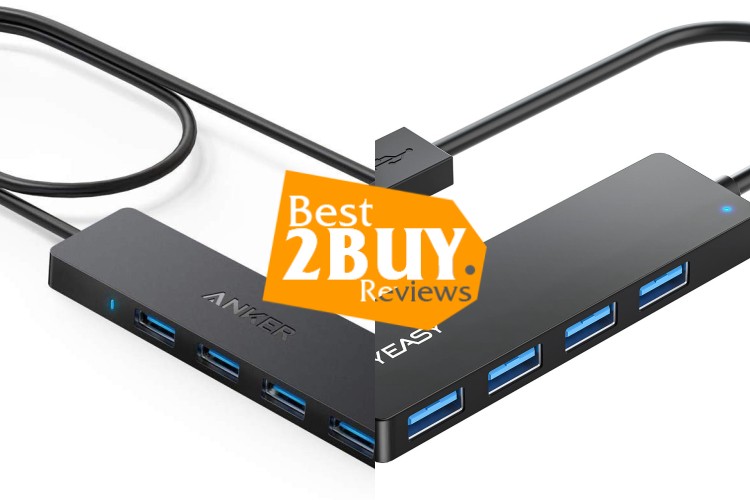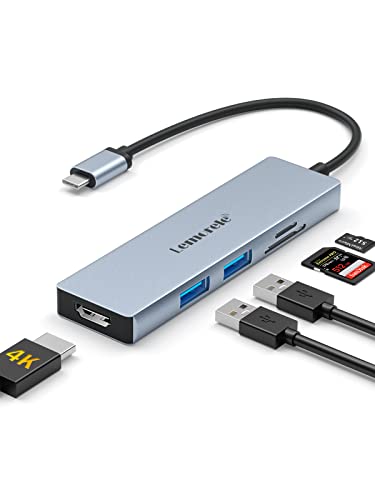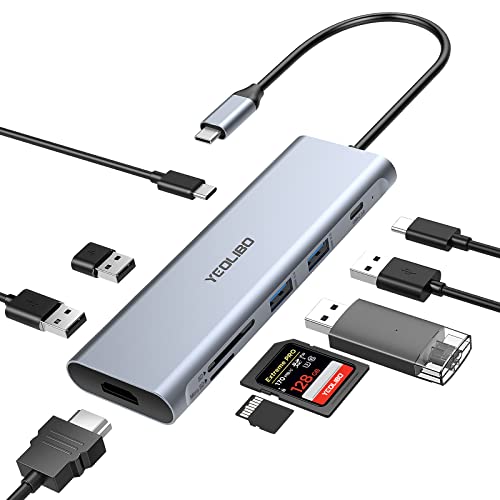A USB hub is a device that expands the number of available USB ports on a computer. It allows you to connect multiple USB devices to your computer or laptop simultaneously, overcoming the limitation of the limited number of USB ports on most devices. USB hubs come in various sizes and configurations, ranging from small portable hubs to larger desktop models with numerous ports.
- 1. Some key points about USB hubs
- 1.1. Function USB hubs
- 1.2. Types of USB hubs
- 1.2.1. Self-powered hubs
- 1.2.2. Bus-powered hubs
- 1.2.3. Powered hubs
- 1.3. USB standards
- 1.4. Port configuration
- 1.5. Plug-and-play
- 1.6. Compatibility
- 2. Benefits of USB hubs
- 2.1. Expanded connectivity
- 2.2. Convenience and organization
- 2.3. Flexibility and versatility
- 2.4. Power distribution
- 2.5. Portability
- 2.6. Compatibility
- 2.7. Future-proofing
- 2.8. Cost-effective solution
- 3. How to choose USB Hubs
- 3.1. Number and type of ports
- 3.2. USB standard
- 3.3. Power requirements
- 3.4. Additional features
- 3.5. Compatibility
- 3.6. Quality and reliability
- 3.7. Design and portability
- 3.8. Price
- 4. In Summary
Some key points about USB hubs
Here are some key points to know about USB hubs:
Function USB hubs
USB hubs act as a central connection point, allowing multiple USB devices to be connected to a single USB port on your computer. They essentially multiply the number of available USB ports, enabling you to connect more devices simultaneously.
Types of USB hubs
USB hubs come in different types based on their connectivity options and features. The most common types are:
Self-powered hubs
These hubs have their own power supply and can provide power to connected USB devices, which is particularly useful for powering devices that require higher power, such as external hard drives.
Bus-powered hubs
These hubs draw power from the USB port they are connected to and provide power to connected devices within the limits of the USB specification.
Powered hubs
These hubs can be either self-powered or bus-powered, depending on the model. They provide additional power to connected devices, beyond what the USB port can supply.
USB standards
USB hubs are available in different USB standards, such as USB 2.0, USB 3.0, USB 3.1, and USB 3.2. The USB standard determines the data transfer speed and other features supported by the hub. USB 3.0 and later versions offer significantly faster data transfer rates compared to USB 2.0
Port configuration
USB hubs can have varying numbers and types of ports. Common configurations include hubs with 4, 7, or 10 ports, but there are models with even more ports. Some hubs also provide additional features like USB-C ports, HDMI outputs, card readers, or Ethernet ports.
Plug-and-play
USB hubs are generally plug-and-play devices, meaning you can connect them to your computer without requiring any additional software or drivers. Once connected, the hub and its ports should be recognized by your operating system, and you can start using the connected USB devices immediately.
Compatibility
USB hubs are backward compatible, which means you can connect older USB devices to a hub that supports a newer USB standard. However, the transfer speeds will be limited to the capabilities of the lowest USB standard involved in the connection.
Benefits of USB hubs
There are several reasons why you might consider buying a USB hub:
Expanded connectivity
USB hubs allow you to connect multiple USB devices to your computer or laptop simultaneously, overcoming the limitation of the limited number of USB ports on most devices. This is particularly useful if you have more devices than available ports or if you frequently switch between different peripherals.
Convenience and organization
A USB hub helps keep your workspace tidy and organized by reducing cable clutter. Instead of having multiple USB cables connecting directly to your computer, you can connect them all to the hub, which then requires only a single connection to your computer.
Flexibility and versatility
USB hubs come in different configurations, including various port numbers, USB standards, and additional features. This allows you to choose a hub that suits your specific needs and accommodates your devices, whether they are USB-A or USB-C, require high data transfer speeds, or need additional power.
Power distribution
Some USB hubs, particularly self-powered or powered hubs, provide power to connected devices. This is beneficial for powering devices that require higher power, such as external hard drives, charging multiple devices simultaneously, or ensuring stable power supply for sensitive peripherals.
Portability
Portable USB hubs are compact and lightweight, making them ideal for travel or on-the-go use. They allow you to expand the connectivity options of your laptop or tablet while maintaining portability.
Compatibility
USB hubs are generally plug-and-play devices, compatible with various operating systems such as Windows, macOS, and Linux. They work with a wide range of USB devices, including keyboards, mice, printers, scanners, external storage devices, cameras, game controllers, and more.
Future-proofing
As technology evolves, new USB standards and devices with different connector types emerge. Having a USB hub that supports the latest standards and connector types ensures compatibility with future devices and prevents the need for frequent upgrades.
Cost-effective solution
USB hubs are often more cost-effective than purchasing additional USB ports or upgrading to a computer with more built-in ports. They provide a practical and affordable solution for expanding connectivity options.
Overall, USB hubs offer convenience, organization, expanded connectivity, and flexibility, making them a valuable accessory for managing and connecting multiple USB devices effectively.
How to choose USB Hubs
When choosing a USB hub, there are several factors to consider to ensure that it meets your needs and is compatible with your devices. Here are some important considerations:
Number and type of ports
Determine how many USB devices you need to connect simultaneously. USB hubs come with varying numbers of ports, such as 4, 7, 10, or more. Consider the types of devices you plan to connect, as some hubs may offer a mix of USB-A, USB-C, HDMI, or other ports.
USB standard
USB hubs are available in different USB standards, such as USB 2.0, USB 3.0, USB 3.1, and USB 3.2. USB 3.0 and later versions offer faster data transfer speeds compared to USB 2.0. If you frequently transfer large files or work with data-intensive devices, consider opting for a hub that supports the latest USB standard.
Power requirements
Determine if you need a hub with additional power capabilities. If you plan to connect power-hungry devices like external hard drives or high-power peripherals, consider a powered hub that can provide sufficient power to those devices. Self-powered hubs have their own power supply, while bus-powered hubs draw power from the USB port they're connected to.
Additional features
Some USB hubs offer extra features like power delivery (PD) capabilities, fast charging ports, Ethernet ports, memory card readers, or audio outputs. Assess your requirements and choose a hub that provides the features you need to enhance your connectivity experience.
Compatibility
Ensure that the USB hub you choose is compatible with your computer's operating system. Most USB hubs are plug-and-play and support common operating systems like Windows, macOS, and Linux. However, it's always a good idea to check the manufacturer's specifications or compatibility list to confirm.
Quality and reliability
Look for USB hubs from reputable manufacturers known for producing reliable and high-quality products. Read customer reviews and ratings to gauge the experiences of other users with the specific hub you're considering.
Design and portability
Consider the physical design of the USB hub. If you plan to use it on the go or in compact spaces, a smaller and more portable hub may be preferable. Desktop hubs with their own power supply may be more suitable for stationary setups.
Price
USB hubs are available at various price points. Set a budget based on your requirements and consider the value for money offered by different models. While it's important to find a hub that fits your budget, also prioritize quality and features to ensure a reliable and efficient solution.
No matter what type of USB hub you choose, it is important to use it safely. Make sure that you do not overload the hub and that you do not connect devices that draw too much power.
By considering these factors, you can select a USB hub that suits your specific needs, provides the required connectivity options, and offers reliable performance for your devices.
In Summary
If you're looking for the best USB hubs, then head over to our featured section. We review and recommend the leading products based on their speed, type, and number of ports. That evaluation bases on experiences of users and experts. Moreover, to have more selection, Check out Amazon, you will find your need fit your budgets.











